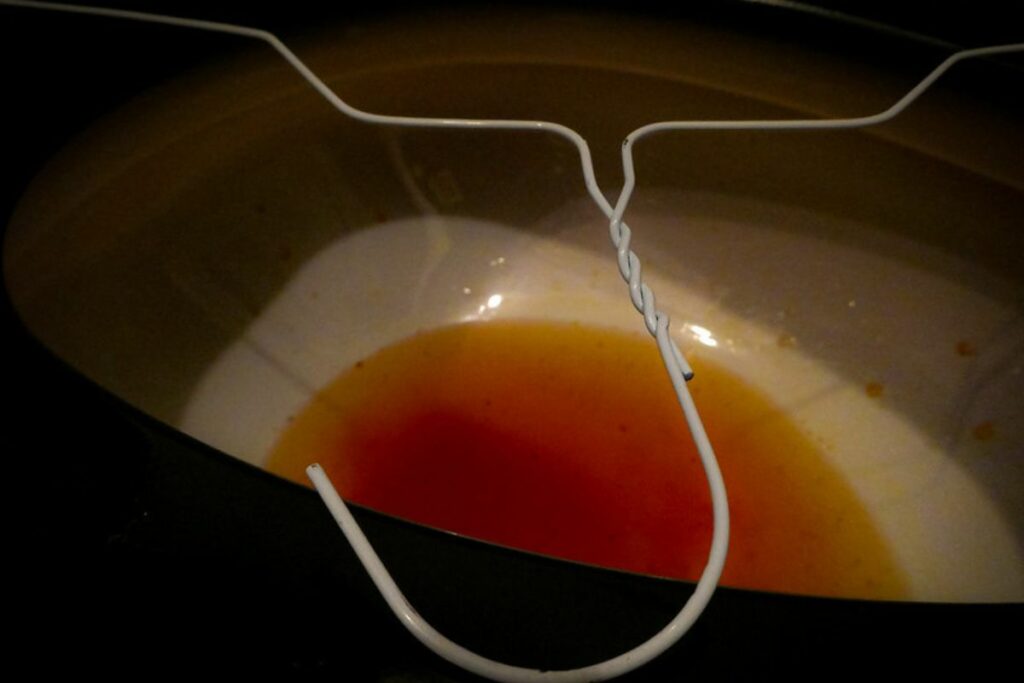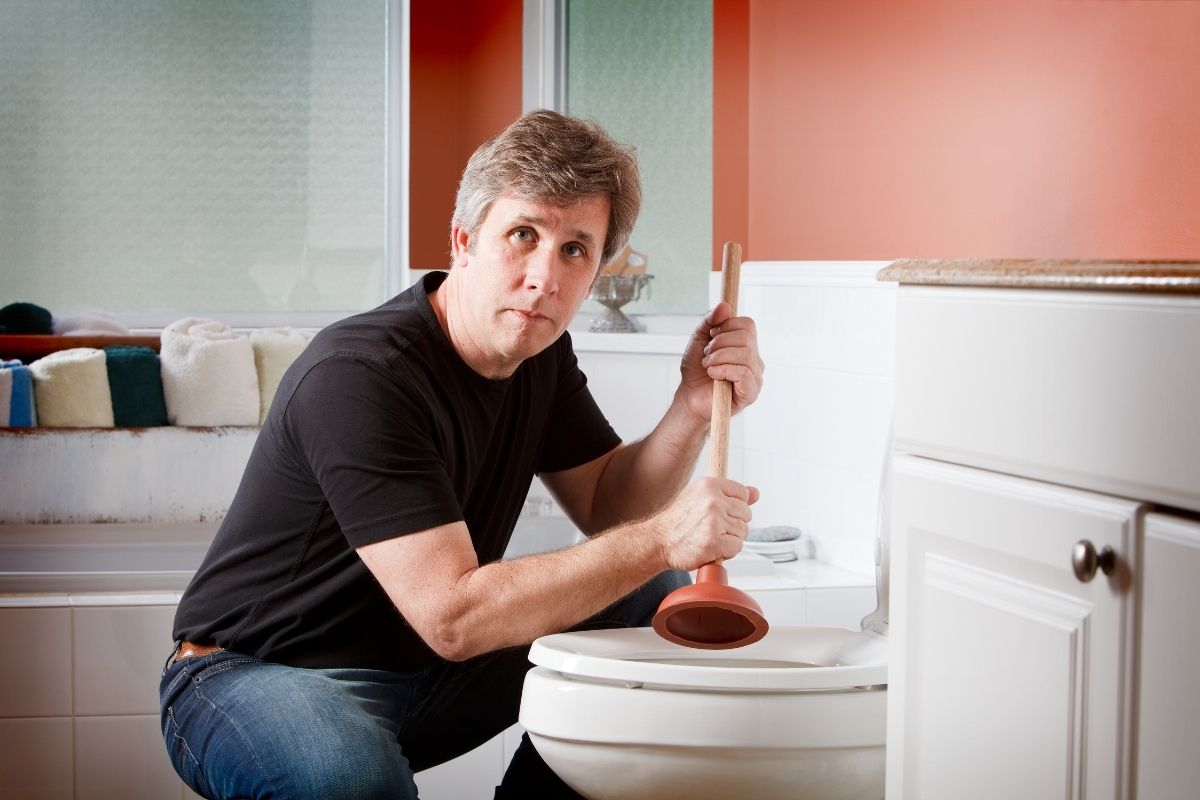Have you ever found yourself in a situation where your toilet is clogged, and you are racking your brains for solutions? You may even wonder if a clogged toilet can actually be unclogged by itself or if it requires your assistance.
Eventually, a clogged toilet will clear itself. Often these objects that clog toilets can be dissolved in water. As a result, the blockage gradually dissolves over time, and the flush’s pressure unclogs the pipe, clearing the clog from the toilet. However, if you flush anything other than human waste or toilet paper, the toilet will not unclog itself.
Let’s delve deeper into the causes of clogs and other information about toilet unclogging that you should be aware of!
What Causes a Clogged Toilet?

The most common materials that clog a toilet are organic matter and toilet paper. Aside from that, flushing items such as feminine hygiene products, diapers, or flushable wipes can cause a clog in your toilet, which can be much worse because such items are non-biodegradable.
If your toilet messes up slightly but then drains slowly, you have a partial clog. Such a clog is convenient to remove and will almost certainly clear itself.
On the other hand, it’s unlikely that your toilet will unclog itself if you have a severe clog or blockage and it doesn’t drain at all. Additionally, it can cause your septic system to back up, which is bad for your toilet.
Even flushing hair down the toilet can result in it becoming tangled and clogging your toilet pipe.
How Long Does It Take for a Toilet to Unclog?
Waiting 30 minutes to an hour is enough time for your toilet to unclog itself. However, if you have the time, it is preferable to wait longer because the more time the clog has, the better it will dissolve, clearing your toilet completely!

If, on the other hand, your toilet does not drain at all, this indicates that you have a severe blockage. Therefore, there is no need to wait because it won’t clear itself. Instead, grab a plunger and get to work!
If you don’t have a plunger, I have some other suggestions for you further down in the article.
What Should You Do if Your Toilet Is Clogged?
You can wait for the toilet to unclog itself. If the clog is severe, perform the task of unclogging yourself with a plunger because it is the simplest option. Or, if it is something solid that has caused a clog, then it is time that you contact a plumber to help you out.
You can even call a plumber if you’re impatiently waiting for the toilet to clear itself or if you’ve already tried and failed to do so.
How Do You Unclog a Toilet?
To unclog a toilet, you must first make sure that you have turned off the water supply because you don’t want the water to keep flowing. Next, you can use the primary method, which is a plunger, to unclog the toilet. The plunger will generate pressure, allowing the water and waste to flow more easily down the drain.
However, before you hop on to unclogging your toilet, it is better to start out well-prepared. Use rubber gloves, eye protection, and a waterproof apron to protect your face and body.
Here are the procedures to follow in order to use a plunger to clear a clogged toilet:
- Push your plunger inside the toilet bowl until you form a seal.
- Continue to raise and lower the plunger until you hear a bubbling sound.
- The pressure created by the plunger will dislodge the clog and force it down the drainage holes.
Even though this is the most basic method for unclogging a toilet, it is possible that it will fail at times. If this method does not work for you or you do not have a plunger, you can definitely try other methods!
Can You Unclog a Toilet Without a Plunger?
You can surely unclog a toilet without a plunger. The other alternatives to a plunger are a toilet brush, plumbing snake, dish soap, baking soda mixture, and hot water. These methods will work just as well as a plunger to unclog a toilet.
Toilet Brush
A toilet brush won’t possibly be as effective as a plunger, but it will still get the work done for you. The only difference is that it can not generate enough pressure as a plunger.
However, with as much pressure as it can generate, it will be able to help you out with unclogging small clogs.
Plumbing Snake
You can make your own plumbing snake by repurposing clothes hangers. It is a long piece of wire that you can insert into the drain to break up large clogs.

Here’s how to work with a plumbing snake:
- Unfold a clothes hanger, then pass it down the drain.
- When you encounter resistance, swivel the hanger to break the clog.
However, make sure to use a plastic-coated hanger because the metal one could scratch the porcelain of your toilet.
Dish Soap
Specifically, dish soap is preferred to unclog your toilet because it is in liquid form. The slippery soap will help lubricate the clogged pipe and allow the waste stuck to slide down easily.
Simply just pour a half cup of dish soap into the toilet bowl, wait for 30 minutes, and then flush! This will unclog your toilet.
Baking Soda Mixture
Baking soda is a tried and tested all-natural solution to unclogging your toilet.

A baking soda mixture is made of one cup baking soda and two cups vinegar. Pour the mixture into the toilet and leave it for half an hour to fizz and remove the clogs from your toilet!
The water will start flowing out of the toilet bowl because of the chemical reaction. You can give it a push using a toilet brush.
Hot Water
Lastly, when nothing works, hot water can be your go-to solution. Pouring the hot water down the drain can help the clog to dissolve quickly.
However, make sure not to use boiling water because it can cause damage to your toilet. Instead, you can use hot tap water.
What Happens if You Don’t Unclog a Toilet?
A clogged toilet can result in problems like overflowing, bacterial growth, odors, and even a worsening clog if it takes longer than an hour for it to unclog on its own or even if you don’t unclog it for a more extended period of time.

Overflow
If your toilet has small leaks that continuously occur, there is not even a need to flush on an already clogged toilet, and you can still experience an overflow.
Bad Odor
The worst part of all is the awful smell that a clogged toilet will emit.
Worsening Clog
Large clogs in your toilet that don’t dissolve in water run the risk of getting worse over time and compacting.
How Do You Keep a Clogged Toilet From Overflowing?
The best way to keep a clogged toilet from overflowing is to close the shut-off valve or raise the toilet float. You can wait until the toilet is clear of blockages before using it, and you don’t even need to flush. Using these techniques, water from the tank will not enter the bowl, preventing it from overflowing.
Turning off the water supply to your toilet will help stop the tank from refilling. So, even if someone accidentally flushes the toilet, there will be no room for further mistakes because your water tank will be empty, preventing your toilet from overflowing.
What Causes Frequent Clogs in Your Toilet?
Your toilet may frequently clog due to slow septic systems, non-biodegradable waste, sewer line problems, low flow toilets, clogged drain lines, and older pipeworks. Investigating and resolving these issues will allow your toilet to function normally without becoming clogged every other day!
Non-biodegradable Waste
If you frequently discard materials such as paper towels, plastic wrappers, wipes, feminine hygiene products, cigarette butts, and other items, this is one strong cause of clogged toilets.
Low Flow Toilet
If you have a low-flow toilet, you probably have an older model. Older toilets have weak flushes that are incapable of dealing with organic waste that builds up over time and causes clogs.
Sewer Line Problems
A faulty sewer line can also be the cause of your frequently clogged toilets, which will necessitate the services of a plumber.
Conclusion
Make sure things are taken care of from the beginning to avoid having to deal with stress later on due to clogged toilets.
Be careful not to flush the non-biodegradable waste down the toilet. If there is still a clog, hiring a plumber is undoubtedly the best course of action.

Amos Christen graduated with a bachelor’s degree in Interior Design from Drexel University — Philadelphia, PA. Since 2003, Amos has worked with top interior design professionals in this area, including architects and interior/graphic/lighting designers. As a skilled interior designer, Amos Christen is highly versed in fine arts and crafts and uses that to supplement his main area of expertise. He often publishes articles related to home décor on several websites, including Sprucetoilets.com, Sprucebathroom.com, and Mybesuitedhome.com. He also contributes to leading interior design magazines.
